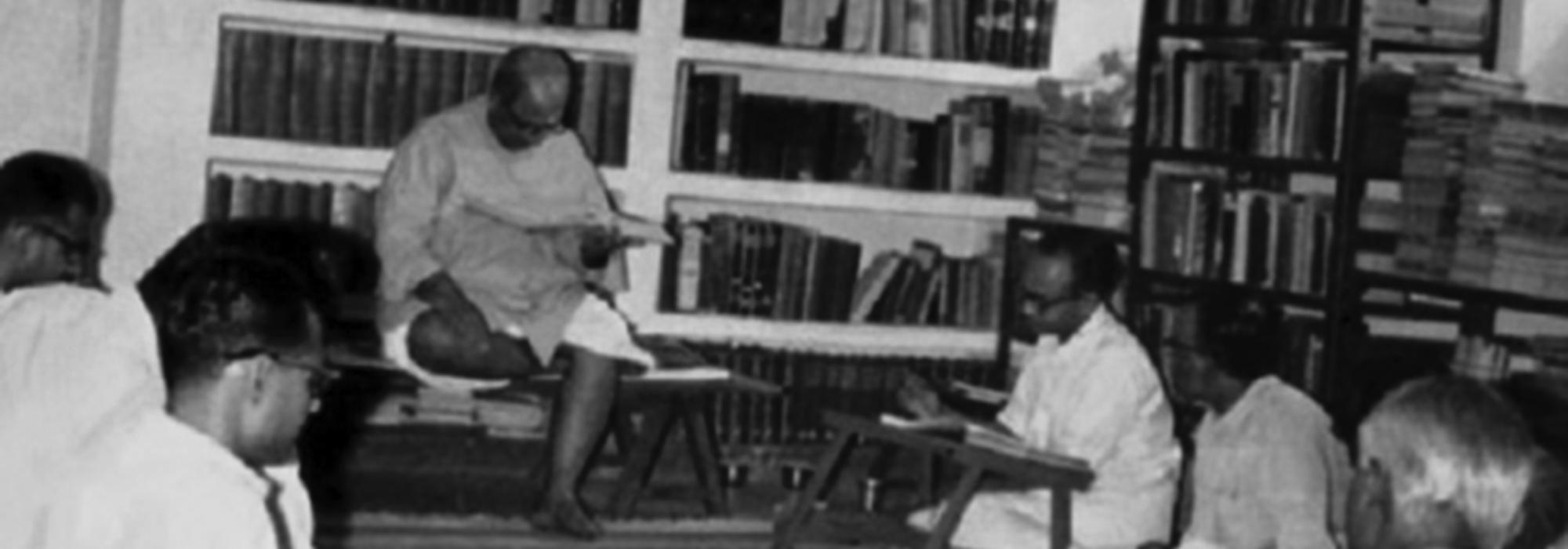I will now outline the qualities of DVG’s personality and works that can guide us in the pursuit of knowledge.
DVG laid great emphasis on the study of classics. He was an ardent devotee of elevating literature in three languages: Sanskrit, Kannada and English. This enabled him to develop a healthy, balanced, harmonious and constructive perspective on life. He exhorted his friends and students to read widely. To this end, he started a study circle in the Gokhale Institute of Public Affairs in 1947 and conducted it every week till he passed away in 1975. He held the study circle so close to his heart that he considered all other activities of the Institute as, to borrow a phrase from French cuisine, hors d’oeuvre, of secondary importance. In the present age of reduced attention spans and bite-sized learning, there is an urgent need to listen to DVG:
Never lose touch with books. Never cease to find a warm place in your heart for all that is elevating in history and literature. Let reading be a passion of your lives; and whether outward fortune smiles upon you or not, may the inward fortune of a high idealism be never denied to you. (Selected Writings of D. V. Gundappa, vol. 2, p. 254)
DVG can help us in honing our expression. He wrote in a lucid, engaging and intimate style. When we read his works, we feel that he is physically present with us, absorbed in friendly conversation. He had the uncanny ability to present the most complicated of subjects in the most simple and cogent manner, without ever dumbing it down. He could do this because he had internalized all the subjects he wrote about. While explaining an abstruse concept, he defines it, enlists its characteristics and gives examples for it from common aspects of life that everybody can readily understand. His exposition evolves naturally like a tree: from the root to trunk, branches, flowers and fruits. Jīvanadharmayoga and Jñāpakacitraśālè are the most sparkling illustrations of his prose style, the former representing śāstra and the latter, kāvya in the widest sense of the term. He often composes easily recallable verses to summarize his arguments. This is a direct reflection of the objective of our ancients in composing saṅgrahaślokas, antaraślokas and parikaraślokas. Today, popular writings present themselves in an academic garb and academic expositions largely propose vacuous theories in high-sounding but vaporous jargon. A friendly tone and inoffensive humour are conspicuously absent. DVG inspires us to do better.
The world today is hurtling forward at a dizzying pace. Easy and widespread access to information has led people to adopt an almost irreverent attitude to wisdom. Reason seems to be lost between jingoistic assertions and blithe dismissals. DVG can help us rise above these abysmal trends. We will do well to pay him heed when he describes the features of an objective mind:
It should hold its opinions firmly, though tentatively. It should not yield easily, nor should it close its doors obstinately to new argument. It should have strength, but not stiffness. It should be elastic, but not flaccid. It should absorb new material, but must select it. Such is the characteristic of a truly rational mind. It does not elevate every passing thought to the height of a conviction. It arranges its possessions in several grades—as impressions, notions, ideas, opinions, beliefs, conclusions, and so forth—and is scrupulous about promoting them from one grade to another … Neither dogmatic and cocksure, nor pusillanimous and feeble-voiced, neither exposed to every passing gust of wind nor impervious to the purifying rays of sunlight—like a well-ventilated and yet well-sheltered house—is the mind of the provisionalist. (Selected Writings of D. V. Gundappa, vol. 3, pp. 199–200)
DVG thought of social work as necessary training that can help us progress in the spiritual path. He emphasized on the observance of duties before the assertion of rights. His exposition of the philosophical underpinnings of active citizenship can help us better appreciate democracy, our chosen form of governance:
The origin of the right is a part of morality … and fitness is another part of that same morality. It is the latter part that has gone neglected in the career of democracy. Its prophets from Rosseau downwards have over-emphasized the “rights” aspect and under-toned the “duties” aspect of the democratic ethic. Herein has been the root of the trouble. (Selected Writings of D. V. Gundappa, vol. 5, p. 53)
Citizenship is a moral discipline, besides being a material privilege; it teaches us habits of thinking and feeling in terms of the lives of the many, whom, but for the bond of the State, we may not count as our own. The State, like the family, is a school to impart lessons in self-abnegation and to purge the soul of its native passions – thus to prepare it for communion with the Supreme Spirit of all Being, all Activity and all Joy. (Selected Writings of D. V. Gundappa, vol. 5, pp. 44–5)
DVG was a staunch, unabashed patriot. He had translated Bankim Chandra’s soul-stirring song, Vande Mataram into Sanskrit as far back as in 1912. On the eve of Indian independence, he composed a set of twenty-four verses in a grand style, titled Svatantrabhārata Abhinandanastava. Speaking of India’s partition, he said: In the past Rāma united us by his travel from Ayodhya to Lanka, Aśoka by his deeds of compassion recorded in edicts throughout the country, and Śaṅkarācārya by traversing our whole land on foot. India will be reunited again (Bhāratabhūvandanam, 5). The most unfortunate development of our age is the denigration of nationalism. DVG’s writings can help us develop positive pride for our country.
Today in India we proudly assert our civilizational identity. This is very good. At this juncture, it is crucial to adopt the attitude of ‘critical conservatism’ as explained by Prof. M Hiriyanna. A careful study of DVG’s works can give depth and direction to our pride. We have much to learn from his insights into timeless concepts such as ṛta, satya, dharma and saundarya. We should strike a healthy balance between past experiences and present aspirations. DVG shows us the way to reconcile tradition and modernity, order and progress, precept and practice, form and content:
Not that the shastras are fundamentally incapable of supplying guidance for to-day. On the other hand, they are wonderfully long-visioned and all-comprehensive in their essentials. Only, we must learn to regard their spirit as more important than their letter. We must discover what is implicit in them and re-interpret them, paying more attention to their nodal precepts than to their subsidiary and formalistic requirements. (Selected Writings of D. V. Gundappa, vol. 3, p. 241)
Tradition, scripture, convention, law, – these represent the static elements in every human society. Reason, criticism, experiment, research, – these represent its dynamic elements. A society that does not want either to stagnate and die of inanition, or else to head for anarchy and dissolution, but is anxious to maintain steady and sure-footed progress towards greater health and strength, should take care to keep both these sets of elements alive and constantly operative. They are respectively the brake and the motor-engine to the car of society, both kinds of apparatus being equally indispensable for its safe journey. (Selected Writings of D. V. Gundappa, vol. 3, p. 261)
Every age aspires to progress by shaking off what it thinks is a burden of the past. To this end, it pursues reformation. We should welcome enlightened progress and guard against reform for its own sake. DVG says:
Owing to the complexities of human nature and owing to the obscurities of large parts of our problems, action either in political or in social reform is bound to be a long and slow series of only second-best achievements. (Selected Writings of D. V. Gundappa, vol. 3, p. 212)
Reform should not be simply a kind of aberration from the normal paths of the community. It should be the result of a generally undertaken revision of attitudes and ideals. It should be a process that will sooner or later come to be accepted by the entire bulk of the community. (Selected Writings of D. V. Gundappa, vol. 3, pp. 262–63)
A reform can work as intended only if it has been preceded by a course of public education and discipline for it. In the absence of intellectual and emotional preparation for it, the new regime may break down and become perverted. (Selected Writings of D. V. Gundappa, vol. 6, p. 10)
Before I conclude I would like to briefly discuss a few aspects of DVG’s thoughts that a sincere student of his works might find somewhat inconsistent with his overall body of work. In some writings, DVG appears to portray the past in a spotless light. We might feel that he gives undue credit to the West, especially the British. He appears to posit the existence of a physical God and ignore the ill-effects of the varṇa system. Correctives to these thoughts exist in DVG’s own works. We can resolve the issue of his portrayal of the past by considering it alongside his lifelong endeavour to make the present a better time. He enriched the Kannada language through his works and instilled confidence in our people by the sheer force of his personality, and so we need not blow his views on the British out of proportion. Finally, we can refine his conception of brahman by passing it through the sieve of avasthātraya-viveka, universal experience.
To my mind, two words wonderfully capture DVG’s personality: grace and serenity. Incidentally, he considered these virtues as “the highest use of literature.” DVG was serene within himself because he had the wisdom to reconcile the disparity inherent in the world. This internal serenity manifested as grace in conduct. I shall conclude by quoting Śatāvadhānī R Ganesh’s words:
The greatest learning from DVG’s personality … is perhaps the following – celebrate life, value enjoyment more than achievement, abandon stubbornness, pursue what you love, be grateful for what you have, help people around you as much as you can, find harmony in dichotomy, follow the path of the golden mean, and most important of all, don’t take yourself too seriously. (Introduction to Foggy Fool’s Farrago, p. 52)
Bibliography
- DVG Kṛti Śreṇi (Ed. Nayak, H M; 11 volumes). Bengaluru: Department of Kannada and Culture, 2013
- Selected Writings of D V Gundappa (Ed. Ramaswamy, S R and Shashi Kiran, B N; 7 volumes published till date). Bengaluru: Gokhale Institute of Public Affairs, 2019, 2020, 2021
- DVG Sārasaṅgraha (Ed. Ganesh, R and Shashi Kiran, B N; 2 volumes). Bengaluru: Gokhale Institute of Public Affairs, 2018
- Foggy Fool’s Farrago. Rangaswamy, Malathi and Ravikumar, Hari. Bengaluru: WISE Words, 2016
- Art Gallery of Memories (3 volumes published till date). Bengaluru: Prekshaa Pratishtana, 2019
- Viraktarāṣṭraka DVG. Venkataramanan, D R. Bengaluru: Navakarnataka Publications, 2014
- Dīvaṭigègaḻu. Ramaswamy, S R. Bengaluru: Sahitya Sindhu Prakashana, 2012
- Kaggakkoṃdu Kaipiḍi. Venkataramanan, D R. Bengaluru: Sri Nithyananda Prakashana, 2010
- Parokṣa. Ganesh, R. Bengaluru: Vasantha Prakashana, 2020
- Vanasuma (Ed. Ramaswamy, S R). Bengaluru: Vijaya College, 2012
- Shiva Rama Krishna. Ganesh, R (English adaptation by Ravikumar, Hari). Bengaluru: Prekshaa Pratishtana, 2019














































